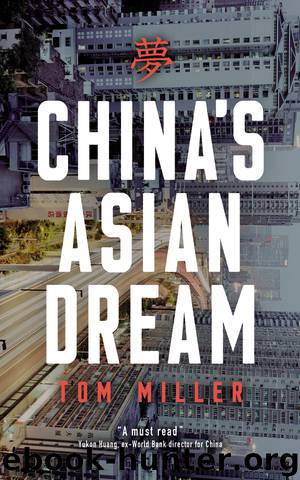China's Asian Dream by Tom Miller

Author:Tom Miller
Language: eng
Format: epub
Publisher: National Book Network International
Published: 2017-04-05T04:00:00+00:00
Ruili’s massive investment requires an equally massive leap of faith in a productive future for China–Myanmar relations. Much will depend on the new NLD government, effectively led by Aung San Suu Kyi in her capacity as “state counsellor”. This position was specially created for her, as the Burmese constitution prohibits anyone with foreign family members from holding the office of predsident: Suu Kyi’s late husband was British, as are her two children. Nevertheless, it is universally presumed that her new position will give her more power than the official president. In any case, as Myanmar’s new foreign minister, Suu Kyi is officially responsible for shaping Myanmar’s foreign policy—and there is no more important relationship than that with China.
It is a fascinating situation. Beijing stood behind Myanmar’s military junta throughout Suu Kyi’s long years in captivity; it had no interest in engaging with the pro-democracy forces nominally under her leadership. Yet Beijing knows it must work with Suu Kyi’s new government, and Suu Kyi knows she must build a healthy relationship with Beijing. After all, one cannot choose one’s neighbour. Six months before the NLD’s landslide victory, in the summer of 2015, Beijing rolled out the red carpet. During that first visit to China, Suu Kyi met President Xi and was treated like a head of state. Human rights activists hoped she would raise the case of Liu Xiaobo, a fellow Nobel Laureate who is serving an eleven-year prison sentence for political crimes. Yet, despite her reputation as an ideologue, she was careful not to upset her hosts. In April 2016, China’s foreign minister was the first foreign dignitary to visit the new government in Naypyidaw.
Since her release, Suu Kyi has fought hard to establish herself as a pragmatic politician, angering many idealistic supporters in the process. This has extended to Chinese investments, on which she has proven surprisingly accommodative. When the previous government asked her to chair the investigation committee set up to report on the controversy over the Letpadaung copper mine, Suu Kyi advised that the project be allowed to continue—for which she was roundly criticized. (Some analysts believe the former ruling party duped her into taking on this investigation, realizing she would look bad no matter what she advised.) In addition, she had little to say about China’s controversial oil and gas pipelines, but has praised Xi Jinping’s Belt and Road Initiative. So Beijing hopes Myanmar’s new leader is someone with whom it can do business.
As foreign minister, Suu Kyi must decide whether two major Chinese investments should go ahead: the stalled Myitsone Dam and CITIC Group’s special economic zone concession at Kyaukphyu. Beijing has consistently voiced its hope that work on the Myitsone Dam will restart, although China Power Investment itself has privately accepted that it must concentrate on smaller projects first. There is also popular support for scrutinizing the deal made with CITIC by the outgoing government in late 2015. With a lack of roads and power infrastructure inhibiting growth, Suu Kyi knows Myanmar cannot afford to push away Chinese investment.
Download
This site does not store any files on its server. We only index and link to content provided by other sites. Please contact the content providers to delete copyright contents if any and email us, we'll remove relevant links or contents immediately.
The Meaning of the Library by unknow(2573)
Six Billion Shoppers by Porter Erisman(2305)
Why Nations Fail: The Origins of Power, Prosperity, and Poverty by Daron Acemoglu & James Robinson(2299)
No Time to Say Goodbye(2119)
Red Notice by Bill Browder(2082)
Currency Trading For Dummies by Brian Dolan(1929)
The Economist [T6, 22 Thg9 2017] by The Economist(1927)
Thank You for Being Late by Thomas L. Friedman(1772)
Bitcoin: The Ultimate Guide to the World of Bitcoin, Bitcoin Mining, Bitcoin Investing, Blockchain Technology, Cryptocurrency (2nd Edition) by Ikuya Takashima(1699)
Amazon FBA: Amazon FBA Blackbook: Everything You Need To Know to Start Your Amazon Business Empire (Amazon Empire, FBA Mastery) by John Fisher(1576)
Coffee: From Bean to Barista by Robert W. Thurston(1549)
The Future Is Asian by Parag Khanna(1484)
The Great Economists by Linda Yueh(1457)
How Money Got Free: Bitcoin and the Fight for the Future of Finance by Brian Patrick Eha(1425)
Grave New World by Stephen D. King(1422)
Pocket World in Figures 2018 by The Economist(1422)
Capitalism Without Capital: The Rise of the Intangible Economy by Jonathan Haskel(1402)
The Sex Business by Economist(1386)
Cultural Intelligence by David C. Thomas(1290)
